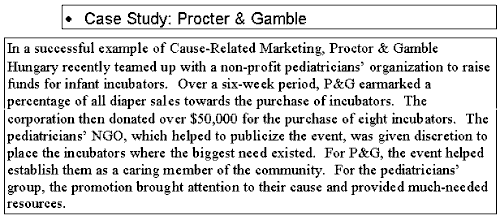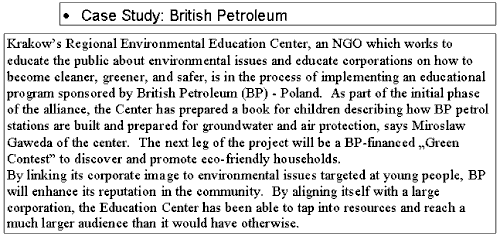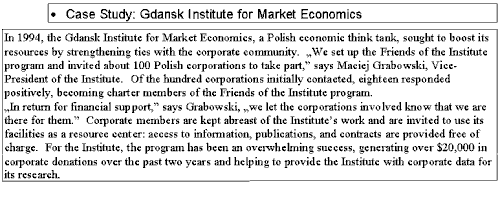
GB No. 2(21)/96
Recent surveys conducted in the Czech Republic and Estonia indicate that the culture of corporate giving has begun to take root in Central and Eastern Europe. According to this new data, a high percentage of corporations in these countries are currently involved in philanthropic activities, with the number of corporations and the degree of their involvement poised to grow as the region's businesses expand and become more profitable.
The quest for this new and still largely untapped resource is fast becoming an important key to the fundraising strategy of many local NGOs, and will only become more essential as international foundations and Western governmental agencies scale back or pull out of the region. The importance of the corporate sector in CEE is further magnified by the absence of other funding sources traditionally available to NGOs; almost all of the region's governments are in the midst of economic austerity programs and no country's middle class is capable of giving substantial support to its community's NGOs.
While some Central and Eastern European countries had strong philanthropic and civic traditions prior to World War II, communist nationalization of virtually all social, political, and economic activity rapidly led to the dissolution of private businesses and their philanthropic activities. Now, as former state-run companies re-orient themselves to compete in a market environment, they have shed the "cradle to grave" social services and are developing a model of voluntary corporate giving similar to those found in the West. Although the concept of good corporate citizenship is a new one in the region, early signs show that it is being widely embraced.
"The fact that businesses are generous supporters of various needs has been established," says a 1996 study on philanthropy in the Czech Republic. The study, conducted by the Donor's Forum found that 90% of the 60 leading Czech businesses surveyed were involved in philanthropic activities. For the rest of Central and Eastern Europe, this is encouraging news. Indeed, a similar study in Estonia, by Professor Voldemar Koga of the Tallinn Pedagogical University and Lilya Wagner of the U.S. Baltic Foundation, found that 80% of Estonian businesses were active in philanthropic endeavors.
Although both studies found widespread corporate participation in philanthropy, each came to the conclusion that corporate giving is generally done in a somewhat haphazard way, with both corporations and NGOs focusing on short-term gains in lieu of building partnerships for long-term goals. Typically, corporations give funds directly to NGOs for short-term, high-visibility, projects. In doing so, they are participating in a kind of passive philanthropy, where isolated giving takes place in response to outside pressures, desire for publicity, or just a multitude of requests. As businesses continue to grow and become more established in the region, this will change.
Some larger corporations are taking steps to establish their own foundations for charitable giving, signaling the onset of a more strategic approach to philanthropy and meeting the long-term needs of their communities. A vital part of this process will entail NGOs and corporations building bridges between their sectors, working together to achieve long-term, mutually beneficial goals.

The challenge to NGOs and companies alike is to establish these lasting partnerships. To do so, NGOs must first gain a better understanding of how and why corporations typically provide support:

Once an NGO has familiarized itself with the various types of corporate giving, the best resource to launch a corporate fund-raising program should be at its finger tips: the NGO's board of directors. Not enough NGOs actually ask their board members for help. A well-rounded board of directors should include individuals that have contact or credibility with the business sector and who are ready to take action. A personal appeal by a board member on behalf of an organization is one of the most effective ways to initiate a relationship with a corporate donor.
Once a relationship is established with a corporate sponsor, an NGO should take pains to turn it into a long-term partnership. As David Logan points out in his book, Transnational Giving, NGOs must develop lasting bonds with businesses: too often, fund raising is driven by the short-term need to make up a budget for a project. This is not how major businesses treat each other, and it is not how NGOs should treat corporate benefactors. It is in the interest of both sides to become familiar with each other's potential on a much broader basis.
As businesses focus more and more on specific localities and specific issues, they will want to establish long-term relationships with reliable, effective NGOs who can partner with the company in addressing social and environmental concerns. NGOs should increasingly approach a company with a view to building a long-term relationship, one which will lead to "repeat business" for the NGO. Even if a company must turn down a proposal, it will sometimes help to find other corporate donors if the ideas seem worthwhile.
Throughout Central and Eastern Europe, a number of innovative projects are under way to develop the NGO-corporate partnership:
The Donor's Forum is responsible for The Support of Philanthropy in the Czech Republic Project, which was created to support partnerships between NGOs, businesses, and the state; and to assist in the development of informed and effective giving programs. For more information about the Donor's Forum, or to receive a copy of their report on the current giving practices of companies in the Czech Republic, please contact:
Helena Ackerman
Donor's Forum Coordinator
Karoliny Svetle 4
110 00 Prague 1, Czech Republic
tel.: (42-2) 26 72 33, 26 72 30, 24 22 71 99
fax: (42-2) 24 22 81 21
e-mail: icn@ms.mff.cuni.cz
This committee developed a program called Fund Raising for the Third Sector as a way to both leverage corporate support and to educate Slovakia's future business leaders about the non-profit sector. The program solicits management and economics students, all volunteers, to research, survey, and analyze Slovakia's NGO community. In this way the project strives to create a future generation of business leaders sensitive to the needs of the NGO community. For more information, please contact:
Mr. Vladimir Raiman
Slovak Committee
of the European Cultural Foundation
Bajkalska 25
827 18 Bratislava, Slovakia
Tel/fax: (42-7) 521-1802 or 521-4577
e-mail: ecf@healthnet-sr.sanet.sk
Dedicated to promoting good corporate citizenship and sustainable development, this Forum operates in 16 countries, brokering partnerships between businesses, the public sector, and established NGOs. For more information, please contact:
Karen Gommersall
Information Officer
The Prince of Wales Business Leaders Forum
5 Cleveland Place
St. James's
London SW1Y 6JJ
United Kingdom
tel.: (44-171) 952-2933 fax: (44-171) 321-6480
e-mail: info@pwblf.demon.co.uk
Internet: http://www.oneworld.org/pwblf/
United Way solicits funds from local businesses and distributes them to social-service NGOs through a grants program. In CEE, United Way Hungary (UWH) has begun to replicate this model of corporate partnership with encouraging results. Over 80% of UWH's funding comes from the corporate sector, and half of their corporate donors provide multi-year funding. Initially, corporate funds raised by UWH were used to sponsor closely-monitored social service projects. In time these projects will evolve into independent NGOs. For more information, please contact:
Dr. Tamas Lovassy
United Way Hungary
Filler utca 47-A
Budapest 1026, Hungary
tel.: (36-1) 209-2925 fax: (36-1) 115-1241
In 1992, the Stefan Batory Foundation in Poland established the Fund to foster the participation of Poland's business community (both local and foreign) in providing financial support for non-profit organizations. The Batory Foundation offers businesses a professional mechanism for managing funds and running open competitions for grantseekers. At the same time, it provides a further incentive by matching all sums donated to the Fund on a 1-to-1 basis. For 1996, it will have approximately $700,000 in revenues. For more information, please contact:
Zbigniew Modrzewski
Program Coordinator
Stefan Batory Foundation
Flory 9, IV fl.
00-586 Warszawa, Poland
tel.: (48-22) 488-055 fax: (48-22) 493-561
e-mail: batory@batory.waw.pl

The Brussels-based European Foundation Center has a program to promote corporate citizenship in Europe. They publish a Selected Bibliography on Foundations and Corporate Funders in Europe, the Directory of Foundation and Corporate Members of the European Foundation Center, and EFC Partners Europe, the newsletter of the EFC corporate citizenship project. For more information about these publications and services, contact:
Tony Glover
Intermediaries Project Coordinator
European Foundation Center
51 Rue de la Concorde
B-1050 Brussels, Belgium
tel.: (32-2) 512-8938 fax: (32-2) 512-3265
e-mail: aries.csp.eric@geo2.poptel.org
This article is reprinted (with many thanks) from NGONews #4 and was written and compiled by Karla Nemeth of NFF-Budapest.